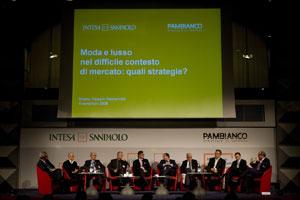 than the price they are paying for it, and, finally, it consists of revaluing the supplier-customer relationship, optimising the supply chain. But it especially consists of not letting oneself be overcome by pessimism, “keeping alive that aspect of the dream that drives every entrepreneur”, said Mario Moretti Polegato founder and chairman of Geox, yesterday in Milan, during a round table organised by Pambianco Strategie di impresa, during the convention “Fashion and luxury in a difficult market context: which strategies?”.
than the price they are paying for it, and, finally, it consists of revaluing the supplier-customer relationship, optimising the supply chain. But it especially consists of not letting oneself be overcome by pessimism, “keeping alive that aspect of the dream that drives every entrepreneur”, said Mario Moretti Polegato founder and chairman of Geox, yesterday in Milan, during a round table organised by Pambianco Strategie di impresa, during the convention “Fashion and luxury in a difficult market context: which strategies?”.
Polegato also insists on the need to patent products internationally in order to avoid being copied and, especially, hopes the United States will introduce codes of conduct that can regulate the financial sector to prevent the occurrence of another colossal crisis such as the one all markets worldwide are currently going through. For Patrizio Bertelli, Managing Director of the Prada Group, the tax rate cut for workers, in exchange for a five day reduction in annual leave, is the right solution for pushing consumption”. One of our skilled workers in the UK is entitled to 21 days’ holidays, whilst the equivalent worker in Italy clocks up 31 days’ holidays a year.
The UK worker, however, starting from a gross salary of € 30 thousand, pockets € 18 thousand net, whereas the Italian worker only brings home € 14,600”. According to Giancarlo Di Risio, Managing Director of Gianni Versace, one should carry on working rigorously, reflecting on investments and targeting developing countries. “China is continuing to grow, whilst I would keep an eye on India which, for the time being, can still not be thought of as a new market”, emphasises Di Risio. The Managing Director of the label, founded in 1978 by Gianni Versace, also makes a distinction between the real recession which the market is experiencing, and the one “happening in our heads, the one generated by panic given that, in some cases, people are worrying more than they should.
We are confronting the crisis for what it is”, adds the manager. The anti-crisis strategy of Calzedonia, a company led by the brands Calzedonia, Intimissimi and Tezenis, is based on the product: “We have focused on the intrinsic quality of the product and on the accessibility of the price. Our consumers feels that what they are buying is worth more than the price they are paying”, asserts Sandro Veronesi, Managing Director of the group. Aiming towards a retail strategy abroad, better still if directly managed, is another cornerstone of the philosophy shared by labels such as Calzedonia, Salvatore Ferragamo and Mariella Burani Fashion group.
“One needs to develop a retail culture and to be the direct controller of the sales point. It is a strategy that required higher investments, but it does pay off”, says the Managing Director of Mariella Burani Fashion group, Giovanni Burani. This doesn’t mean you need to buy huge flagship stores, “even though this is an important tool, especially on the Asian markets” says Michele Norsa, Managing and General Director of Salvatore Ferragamo, “you don’t get turnover from the size of your floor space; you get it from the amount of traffic”. Photograph: An image of the round table organised by Pambianco.
Related News
Photos
More>>trade
- (USA)Bellarmine Fashion Show is the Hottest Ticket in Town
- Mercedes Benz Fashion Week Mexico - Alberto Rodriguez Spring / Summer 2009
- Mercedes Benz Fashion Week Mexico - Jesus Ibarra and Bertoldo Spring / Summer
- A Second Life for Fashion: Used Clothing
- Portuguese designers' creations at Lisbon Fashion Week





